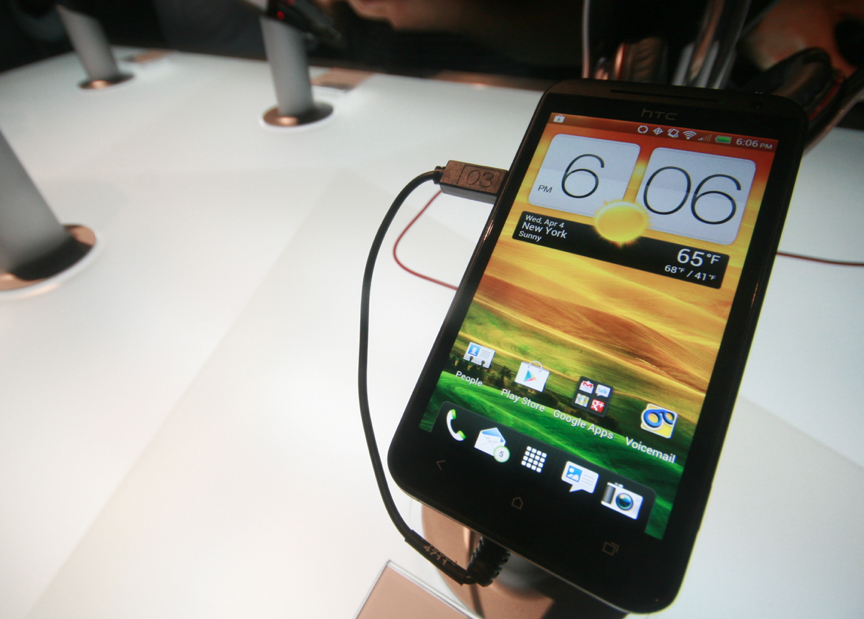What the HTC EVO 4G LTE means for Sprint and its future

(Photo Credit: Ricardo Bilton, ZDNet)
This post was initially supposed to be about the various features offered by the HTC EVO 4G LTE, the latest Android phone to feature far more characters in its name than is at all necessary.
But midway through writing this, it dawned on me that the HTC EVO 4G LTE itself is pretty uninteresting. Enticing, impressive, sure, but relatively and irrevocably boring compared to, say, the One X.
What's more interesting, I realized, is what the phone means -- not for HTC, but for Sprint. Sprint has a lot riding on this device, which is probably why it announced the device alongside HTC. Much of this has to do with Sprint's current state in the carrier race (a distant third, if you were unaware) as well as its immediate and long term future. Make no mistake, this phone has much to do with 2014 as it does with April 2012.
(Disclosure: I'm a fairly content Sprint customer myself, so perhaps I have a vested/biased interest in all of this. Something to keep in mind, I guess.)
4G LTE(ventually)
As with the recently-announced LTE-ready LG Viper, the EVO 4G LTE makes clear the biggest issue with Sprint's LTE network: It doesn't exist. That's a problem, because, while Verizon and AT&T own networks are, to varying degrees, up and running, Sprint's own is still in the womb. Six cities -- Atlanta, Dallas, San Antonio, Houston, Kansas City, and Baltimore -- will get the LTE green light by the middle of the year, which is a good start, certainly, but one that must be joined rapidly with many more additions.
HD Voice (when you can get it)
One of the more notable features with the EVO 4G LTE is that it's the first Sprint phone to offer HD Voice. Somewhat of unhelpful buzzword, HD Voice refers to a number of separate engineering feats that, when combined, vastly improve the quality of voice calls.
Sprint demonstrated this functionality during the phone's unveiling by allowing the press to test the device alongside its predecessor. The conversation on the ancient EVO sounded like any other cell phone conversation -- hollow, fuzzy, and not really all that great-sounding. But when the Sprint rep shifted the conversation to the EVO LTE 4G, it was clear that the improvements made were significant ones. The representative's voice on the new phone was clear and stable, closer to the audio quality of a Skype call than anything else. Background noise was all but eliminated.
The developments are nice, but there are some caveats. For one, both ends of the conversation must be using a HD Voice-equipped phone in order to actually use the new feature, which severely limits its spread - at least for now. This will, of course, become less of a concern once Sprint launches more HD Voice-ready phones. Limitations aside, HD Voice is a much-needed improvement and something that Sprint can confidently count as a differentiator.
(Photo Credit: Sascha Segan, PC MAG)
The Sprint difference
Speaking of differentiators, probably the most significant one for Sprint remains its unlimited data plan. Rivals Verizon and AT&T have already dropped their own unlimited offerings, leaving Sprint as the only carrier still crazy enough to offer consumers unrestricted data. That's a big deal, and it's made even bigger by the fact that Sprint says it plans to offer a similar deal with its LTE network. Crazy? Perhaps. But it's something consumers are certain to pick up on as the other carriers put on the data squeeze.
We need to talk about Heese
There's probably no one more concerned about Sprint's future than CEO Dan Hesse, whose tenure so far has been something of a mixed bag. Picking up where his ousted predecessor Gary Forsee left off, Hesse inherited a Sprint that was gravely injured by its messy merger with Nextel. Left behind by the iPhone-packing AT&T and Verizon, Hesse's Sprint is also one that recently announced that it was finished with its WiMAX efforts. Clearly, Hesse and Sprint need this whole LTE thing to go off without a hitch.
And then there's the iPhone question. If the latest iPad is any indication, Apple is almost certainly going the LTE route with the next iPhone -- a likelihood that should horrify Sprint. With no LTE network to speak of yet, the carrier may just get caught with its pants down when the next iPhone launches later this year.
Sprint, of course, has a lot riding on the iPhone. The company is set to shell out at least $15 billion to Apple over the next four years in order to get its hands on the device. That should sound crazy to you because it is: Sprint is literally banking their whole operation on the success of its iPhone plans. But for a company that hasn't turned a profit since 2008, it's clear that Sprint has no choice but to take some chances.
This is where the HTC EVO LTE 4G, LG Viper, and Galaxy Nexus come in. If these phones indicate anything, its that Sprint's LTE ambitions are already bearing fruit. And that's a big deal for both consumers and investors, the latter of which have not been entirely pleased with Sprint's fortunes over the past few years. But Sprint needs them all to be patient, at least until its LTE network begins its ascent.
